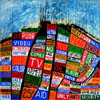
Comment
on this story
|
 |

This Week: Classic minimalist rock by Rhys Chatham and newly philosophical Radiohead
Rhys Chatham

An Angel Moves Too Fast to See: Selected Works 1971-1989 (Table of the Elements)
In the mid-1970s, when classical- meets-rock still equaled Emerson, Lake and Palmer, an erstwhile harpsichord tuner and budding composer named Rhys Chatham went to see the Ramones at CBGB and totally got it. As part of the then-blossoming minimalist school, Chatham saw that what he and Terry Riley and Steve Reich were doing was similar to what Joey, Johnny, Dee Dee, and Marky were up to, with one key difference: To paraphrase Chatham's liner notes to the new career-capping three-disc An Angel Moves Too Fast to See, the punk bands were using two or three chords, whereas the minimalists were using only one. Chatham went on to create music that crossed minimalist theories with the volume, instrumentation, and beat of rock music—and often played it in rock clubs for frugging aesthetes. By so doing, he helped fuel the foment of New York's late '70s/early '80s music scene and influenced the likes of Glenn Branca and Sonic Youth, who, well, you know. . . .
All this needs explaining because Chatham remains obscure outside of art-music cognoscenti, and even there he is more name-dropped than heard. Naturally, the experimental-music obsessives at Atlanta's Table of the Elements label have been working on this be-all-end-all Chatham compendium for years in hopes of doing him justice. Now that it's out, it seems they may have succeeded better than they planned.
See, Chatham's innovation lies within the confines of that single chord—namely the overtone series, the ghostly harmonics created as a byproduct of the resonance of, for example, guitar strings. Overtones are most obvious and impressive when heard loud—say, through an amplifier turned up as high as it will go. Thus "Guitar Trio" (1977) and "Drastic Classicism" (1982) find Chatham and three or more guitarists worrying the same blaring, dissonant chord over bass-and-drums rock backing so that they sound like 30 or more guitarists. Even with the limitations of recording technology, it's easy to imagine this music causing a stir.
But as the rest of An Angel reveals, Chatham pretty much had just the one great idea. Two pieces scored for brass and percussion, "Waterloo No. 2" and "Massacre on MacDougal Street," recycle Philip Glass. The 20-minute-plus "Die Donnergötter" and the sprawling title piece (which takes up the entirety of disc three) use massed guitars—in the latter piece, over 100—in more expansive structures but fail to impress on more mundane compositional grounds; they plod pleasantly, but uninterestingly, and at length.
Ironically, the wildest piece on An Angel predates Chatham's rendezvous with fate on the Bowery. "Two Gongs" (1971) features the composer and collaborator Yoshimasa Wada paddling up over an hour of static but ever-shifting harmonic storm and shimmer on the title instruments. Everything good and compelling about Chatham's music as collected in this set is present, even crystallized here, and any fan of experimental music from the last four decades would do well to pay heed.
—Lee Gardner
Radiohead

Hail To the Thief (the gloaming) (Parlophone)
With Hail To the Thief, Radiohead presents something more than the shallow prog-rock political statement the title might suggest. Hail is a quality album. Radiohead has emerged from the impersonal miasma of Kid A and Amnesiac, giving listeners a visceral record reminiscent of earlier Radiohead albums, only without all the redundant evocation of alienation—well OK, it's here too, but smarter, more mature.
The instrumentation is the highlight of Hail. Easily moving from sorrowful to frenzied, angry to dreamy, it maneuvers the demanding emotional gamut of singer Thom Yorke's cryptic libretto. These new songs are original, and interesting, and radiate emotion. Which is amazing considering how much electronica is present. Producer Nigel Godrich meshes the acoustic and synthetic instrumentation seamlessly, and creates an aural space completely appropriate for the mood Thom Yorke hoped to communicate: eerily foreboding.
According to Yorke, the album's subtitle, the gloaming, refers to "a general all-enveloping darkness that's slowly taking over mankind...the rise of fascism and ignorance: like some plague from the middle ages. The gloaming has begun. We're in the darkness. This has happened before. Go read some history." Fortunately, I've only read that quote. So I optimistically project a mockingly serious tone onto the British voice saying that in my head. Still, there are moments while listening when you wonder just how seriously this guy takes his understanding of humanity. Does Yorke actually believe he's struck some philosophical reservoir yet untouched? Him and Nietzsche, right?
No, I kid, I kid. I'm quite a fan of this album. It's well worth checking out.
—Alexander Vincent

June 19, 2003 * Vol. 13, No. 25
© 2003 Metro Pulse
|